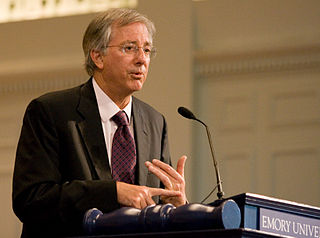A Quote by Elliott Abrams
The Middle East that Obama inherited in 2009 was largely at peace, for the surge in Iraq had beaten down the al Qaeda-linked groups. U.S. relations with traditional allies in the Gulf, Jordan, Israel and Egypt were very good. Iran was contained, its Revolutionary Guard forces at home.
Related Quotes
Yes, Obama took over two wars from Bush - just as President Richard Nixon inherited Vietnam from President Lyndon Johnson and President Dwight Eisenhower inherited Korea from President Harry Truman. But at least the war in Iraq was all but won by 2009, thanks largely to the very surge Obama had opposed as a senator.
Our challenge is much more pervasive than it would be if we were just facing one enemy in one place. [Instead there is] the Middle East, Iraq, North Korea, Iran. There's a relatively long list that we believe are linked to the al Qaeda network in the Philippines, in Indonesia and in Yemen and other places. That makes it very clear that this is a global network.
Iraq, for the first time, gives al Qaeda and its allies contiguous safe-haven territory to train and launch attacks into the Levant. First into Jordan and Syria, and then into Lebanon, and virtually and ultimately into Israel and probably Egypt too. It also gives them haven to eventually work their way toward Turkey and into the Arabian Peninsula.
More likely, there were probably some real divisions within the Iranian government - some groups wanted to ally with al Qaeda against us, others didn't want to have anything to do with that. So I think that debate resulted in no decision being made for awhile. The problem was they left the al-Qaeda folks in Iran in the hands of their intelligence services and Revolutionary Guard, who didn't really keep an eye on them - and may not have kept an eye on them on purpose.
We have not destroyed al Qaeda, so we still have that to worry about. We have its traditional allies, the Kashmiri groups, the groups that are operating now in Iraq, and now we have a third tier of threat amongst the Muslims that live in the West and who are inspired to do something against the West by the example of the other two tiers.
In terms of Iraq, al Qaeda valued Iraq because we destroyed a government it wanted destroyed and because we put soldiers on the ground and forces that they could attack. Al Qaeda is basically an insurgent organization that was formed on the model of the Afghan groups. And being bred in that war, they value a contiguous safe haven as much as anything else.
I would recommend any American who wants to understand where the government is going in the next four years of George W. Bush presidency to get a copy of her confirmation hearings before the Senate Foreign Relations Committee. It's a road map, and it's pretty frightening testimony. Their definition of where democracy should go in the Middle East doesn't include Egypt, Jordan, Saudi Arabia, Pakistan; it only includes Iraq, Iran, and Syria.
Sadly, a U.S. invasion of Iraq 'would threaten the whole stability of the Middle East' - or so Amr Moussa, secretary-general of the Arab League, told the BBC on Tuesday. Amr's talking points are so Sept. 10: It's supposed to destabilize the Middle East. The stability of the Middle East is unique in the non-democratic world and it's the lack of change in Iraq, Iran, Saudi Arabia, Syria, Egypt that's turned them into a fetid swamp of terrorist bottom-feeders.
When we strengthen our relations with the Gulf states, when we cooperate with the Arabs, everybody asks if we are looking for a new geopolitical place. But in the Middle East and the Gulf, you can find German, French and British goods everywhere. German relations to these states are very good, as are English and French relations. Does this make them Arab-oriented?
If you want peace and well-being to be in place in the Middle East and you want terrorism to be uprooted, then there's no path other than the presence of the Islamic Republic of Iran, you saw that in Iraq, Syria, Lebanon and Yemen that the power that was able to help the people of Iraq, Syria, Lebanon and Yemen in the face of terrorist groups was the Islamic Republic of Iran.
New security architecture is being laid down in the Northern Middle East, Lebanon, Syria, Iraq, in which pro-Iranian governments are consolidating their grip on the territory and they're backed by Russia, to a large degree. And this has caused great grief and consternation in Saudi Arabia and amongst many of the United States' allies, Israel, the Gulf countries, Turkey, because they see this new architecture of security and Iranian influence and Russian influence as something that's very bad for them.


































